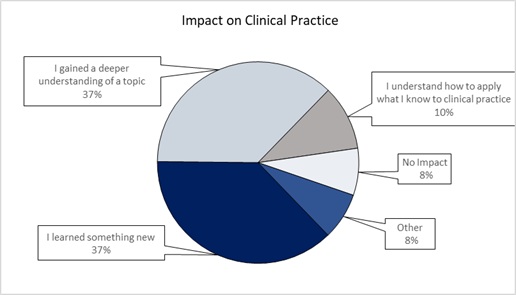Session Information
Session Type: Poster Session C
Session Time: 10:30AM-12:30PM
Background/Purpose: ACR Convergence is a key platform for sharing cutting-edge research and clinical insights in rheumatology. To extend the educational value of select sessions beyond the meeting itself, a pilot collaboration between ACR and theMednet.org was developed. The initiative, titled “Continue the Conversation,” aimed to foster enduring post-conference engagement. This was accomplished by posing timely clinical questions from ACR Convergence sessions to theMednet experts and distributing their answers, sometimes paired with interactive polls, via email to the broader rheumatology community.
Methods: Clinically relevant questions were curated by theMednet editorial team based on pre-selected presentations from ACR Convergence 2024. These questions were sent to experts (including session presenters) for commentary. Polls were created for some questions to encourage participation, and a custom ACR-specific program tag was added to promote visibility and searchability. Each question included contextual information and direct reference to the corresponding ACR session. The Q&A was disseminated via email newsletters over a 6-8 week period, and a comprehensive summary was shared with physicians at the end of the program. Engagement metrics were tracked across multiple domains. CME credit claims were also reviewed.
Results: A total of nine questions and four polls were created based on the ACR Convergence presentations. During the program, 675 physicians engaged with Q&A content. The content reached a broad audience, with 4,845 total views across the nine questions with an average of 2.7 views per physician per question. Individual Q&A posts received an average of 538 views, and engagement with associated polls came from 201 unique voters with participation spanning 560 institutions (Image 1). Viewers spent an average of 12 minutes on the site viewing program content. Engagement was broad-based with poll participants and viewers representing diverse geographic regions and practice settings across rheumatology, pulmonology, and nephrology (Image 2). A total of 345 CME credits were claimed for 169 unique physicians. Of those claims, in regard toimpact on clinical practice, 37% of respondents stated they gained a deeper understanding of a topic, 37% learned something new, 10% stated they understand how to apply what they know to clinical practice, 8% stated there was no impact, and 8% responded “other” (Image 3).
Conclusion: The “Continue the Conversation” initiative effectively extended the impact of ACR Convergence 2024 by fostering sustained engagement with key clinical topics through expert-led Q&A on theMednet.org. High levels of participation, CME activity, and reported practice relevance demonstrate that digital platforms can play a critical role in translating conference content into lasting educational value. These findings support continued innovation in post-conference learning and highlight opportunities to further integrate digital engagement into future ACR educational strategies.
 Image 1: Summary of Engagement Per Question
Image 1: Summary of Engagement Per Question
.jpg) Image 3: Impact on Clinical Practice
Image 3: Impact on Clinical Practice
To cite this abstract in AMA style:
Couette N, Singh H, Briones M, Housri N, Manno R. Enhancing Post-Conference Engagement Through Expert Q&A: A Pilot Collaboration Between ACR Convergence & theMednet.org [abstract]. Arthritis Rheumatol. 2025; 77 (suppl 9). https://acrabstracts.org/abstract/enhancing-post-conference-engagement-through-expert-qa-a-pilot-collaboration-between-acr-convergence-themednet-org/. Accessed .« Back to ACR Convergence 2025
ACR Meeting Abstracts - https://acrabstracts.org/abstract/enhancing-post-conference-engagement-through-expert-qa-a-pilot-collaboration-between-acr-convergence-themednet-org/

.jpg)